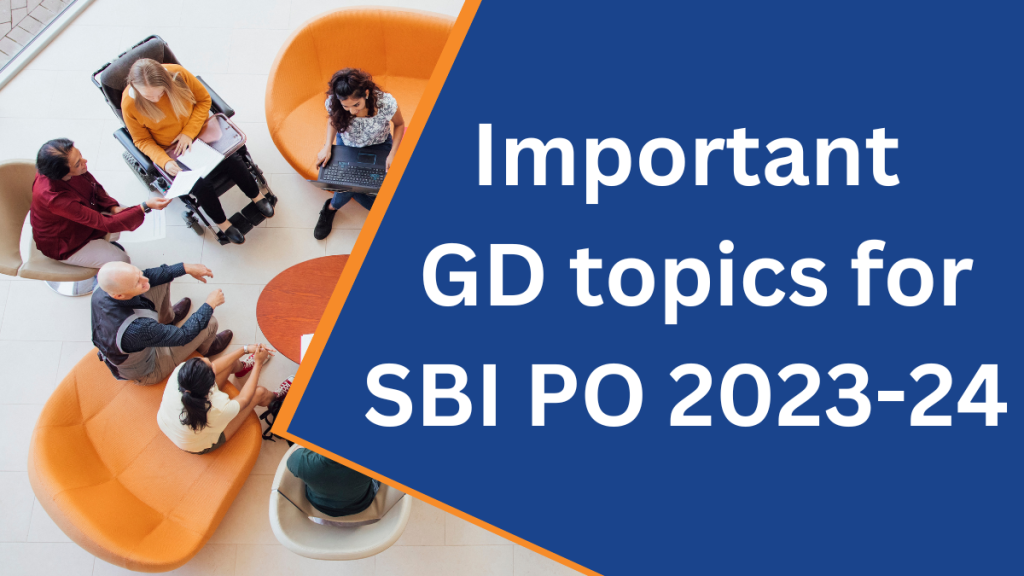The Group Discussion (GD) round is a crucial aspect of the State Bank of India (SBI) Probationary Officer (PO) selection process, marking Phase III of the examination. Success in this round is pivotal as the marks obtained in the GD and Personal Interview (PI) will be combined with the scores from the SBI PO Main exam to determine the final merit list. The GD is a group testing phase designed to assess an individual’s capacity to collaborate effectively within a team. Various personality traits are scrutinized during this round, including public speaking skills, confidence in articulating opinions, team spirit, social behaviour, and problem-solving capabilities.
During a GD, participants are presented with a topic and given a few minutes to gather their thoughts and formulate opinions about it. Subsequently, each participant is required to present their views within the group, supporting their arguments with facts and evidence. This exercise demands a bold expression of opinions while maintaining composure and respecting the perspectives of fellow group members.
As candidates gear up for the SBI PO 2023-24 GD round, it becomes imperative to delve into the most important topics that may be presented for discussion. These topics are carefully chosen to evaluate not just the depth of knowledge but also the ability to think critically and communicate effectively. Some potential topics include current affairs, socio-economic issues, ethical dilemmas, and banking-related challenges.

To succeed in the upcoming SBI PO Group Discussion round, candidates must hone their skills in information gathering, logical reasoning, and persuasive communication. Additionally, cultivating a collaborative and respectful demeanor will contribute to a well-rounded performance in this critical phase of the selection process. The journey towards becoming an SBI Probationary Officer involves mastering the art of effective group communication, and candidates should approach this challenge with a strategic mindset and a commitment to excellence.
SBI PO 2023-24 Eligibility Criteria
A successful SBI PO application is contingent upon a comprehensive understanding of the SBI PO eligibility criteria. A successful application for the State Bank of India (SBI) Probationary Officer (PO) position hinges on a thorough understanding of the SBI PO eligibility criteria for the 2023 exam. Aspiring candidates must adhere to specific requirements outlined by SBI, notably possessing a graduation degree from a recognized university or an equivalent qualification recognized by the Central Government. The SBI PO age limit spans from a minimum of 21 years to a maximum of 30 years, with applicable age relaxation of 3 to 15 years based on specific categories. It is imperative for candidates to review and comply with these criteria to ensure eligibility for participation in the SBI PO examination.
The educational criteria for SBI PO require candidates to have a graduation degree in any discipline from a recognized university or an equivalent qualification recognized by the Central Government. Candidates in their final year/semester of graduation may apply provisionally, provided they can produce proof of having passed the graduation examination on or before the discussion, if called for an interview. Those with Integrated Dual Degree (IDD) certificates should ensure that the date of passing the IDD is on or before the relevant date Additionally, candidates with a Chartered Accountant qualification are also eligible to apply. Understanding and meeting these educational criteria are vital steps in ensuring a valid and well-prepared application for the SBI PO 2023-24 Exam
| Criteria | Details |
| Educational Criteria | Graduation in any discipline from a recognised University or any equivalent qualification recognised as such by the Central Government. |
| Age Criteria | Minimum-21 Years / Maximum-30 Years |
| Age Relaxation | Minimum-3 Years / Maximum-15 Years |
SBI PO 2023-24 GD : Details
Embarking on a career with the State Bank of India (SBI) through the SBI PO exam 2023-24 is a momentous pursuit given the promising career progression it offers. A comprehensive grasp of the SBI PO exam format is paramount to navigate this competitive journey successfully and minimize errors. Understanding the SBI PO Exam Pattern and Syllabus is important to prepare for the exam. It unfolds in three phases: Prelims, Mains, and Interview/Group Exercise & Interview, with a total of 350 marks allocated across these stages.
The Prelims (Phase 1) is a 100-mark, one-hour examination, setting the stage for the Mains (Phase 2), comprising an Objective Test (Paper 1) for 200 marks spanning three hours and an English Descriptive Test (Paper 2) for 50 marks with a 30-minute duration. The final phase (Phase 3) involves Group Exercise and Interview, accounting for 50 marks. Upon completion of these phases, the list of successful candidates will be compiled.
A comprehensive understanding of the SBI PO syllabus for both Prelims and Mains is crucial. To bolster your preparation, reliable SBI PO books and participation in free SBI PO test series online are highly recommended. Exploring ixamBee’s SBI PO Online Course can provide valuable insights and support throughout your preparation, ensuring you are well-equipped for success in the SBI PO exam. Stay competitive and seize the exceptional career advancement opportunities that SBI jobs offer.
Types of Group Discussion (GD) Topics
Group Discussion (GD) topics are diverse and can be categorized in several ways, providing candidates with a range of scenarios to navigate during the selection process. One classification method is based on the nature of the topics presented:
Topic-Based GD Topics:
- Factual GD Topics: Rooted in concrete data and facts, these discussions often revolve around current events. For instance, a GD topic on “Repo Rate Cut & Likely Impact” requires candidates to analyze the factual information available and present their views.
- Controversial GD Topics: Characterized by their inherently argumentative nature, these GD topics delve into sensitive areas like politics, international relations, or religion. Participants are tasked with navigating diverse and often opposing opinions within the group discussion. Success in these discussions requires the ability to articulate a well-reasoned and balanced perspective, showcasing both knowledge of the subject matter and the capacity to engage in constructive dialogue, even amidst varying viewpoints and potential controversies.
- Abstract GD Topic: Abstract GD topics, centered on intangible concepts, are infrequently encountered in examinations. However, when presented, they engage participants in discussions that demand lateral thinking and expressiveness of opinions. These topics often explore philosophical ideas, ethical dilemmas, or ambiguous themes, challenging candidates to delve into the realm of abstract thinking and articulate their perspectives effectively within the group setting. Mastering these discussions showcases the ability to navigate complex and open-ended subjects with depth and clarity.
Case Studies GD Topics:
Presented as real-life situations, these topics challenge participants to analyze and respond to a given scenario. For example, a case study could involve a situation where a bank employee witnesses a colleague being rude to a customer and not following bank norms. Candidates must discuss how they would handle such a situation.
Abstract GD Topics:
Depending on individual interpretation, abstract GD topics often involve famous sayings or lines from literature. These discussions require participants to share their perspectives, and no specific prior knowledge is necessary. Understanding the nuances of each category is crucial for candidates preparing for GD rounds. It allows them to anticipate the nature of the discussion, formulate informed opinions, and effectively contribute to the group dynamics. To excel in GD, candidates should develop not only subject knowledge but also critical thinking and communication skills to navigate diverse scenarios effectively.
Some Important SBI PO GD Topics
In the competitive landscape of the State Bank of India (SBI) Probationary Officer (PO) selection process, Group Discussions (GD) play a pivotal role. Aspiring candidates must prepare for a diverse array of topics that may be presented. Here are some crucial SBI PO GD topics:
- ChatGPT and Its Impact on Modern Society
- AI and Its Future
- Cybersecurity and Its Relevance Today
- Implementation of NEP
- Online Education and Work from Home
- Role of Media on Modern Society
- Freedom of Speech Vs. Defamation
- Old Pension Scheme Vs. New Pension Scheme
- Should Death Penalty be Abolished in India?
- Make in India: Is it Boosting Development?
- Startup India: Is it Boosting Entrepreneurship?
- Importance of G20 Summit and its Overview
- Is India/World Ready for Another Epidemic?
- Union Budget; Economic Survey
- Impact of Technology on Banking Sector
- Decrease in the Value of Indian Currency: Reasons and Impact
- Direct Trade in Indian Rupee/Future of Indian Rupee as Hard Currency
- Globalization of the Economy: Boon or Bane?
- Impact of CBDC on the Financial System and Economy of India
- Cryptocurrency and Bitcoins: Pros and Cons
- Rising NPAs and Loan Frauds in Banking Sector
- Future of Banking Sector in India
- Privatization/Disinvestment of Public Sector Banks
- Financial Inclusion Progress: An Introspection
- Financial Literacy: Relevance and Future
- Importance of Heterogeneous Banking Sector
- Economic Crisis in Neighboring Countries: Is India Resilient?
- Impact of Climate Change and Takeaways from Climate Change Summit
- Social Media and Its Impact on Society
- Women Empowerment and Crime Against Women
- Increasing Youth Suicides: Can Therapy Help?
- Rising Unemployment: How Bad is the Situation?
- Substance Abuse in India
- Role of Agriculture in Rural Development
- Is Work-Life Balance a Myth?
- Hard Work Vs. Smart Work
- Work from Home or Work from Office
- Virtual Learning: Pros and Cons
- Importance of Company Ethics and Profit
- One Child Policy in India: Thoughts?
- Use of Technology to Tackle Financial Crimes
- Will Private Cars Increase After Lockdown?
- Do Beauty Contests Increase the Objectification of Women?
- SAARC Conference: Key Takeaways
- Recent Labour Reforms: An Introspection
- Styrene Gas Leak in Vishakhapatnam
- Disaster Management in India: Cyclones and Earthquakes
- Depression & Mental Illness in India
- Should Kids’ Reality Shows Be Banned?
- Censorship of Web Series: Pros & Cons
- Impact of 5G on the Global Economy
- Inflation Impact on India and its Future
- Adani Group Fallout: Its Impact on the Indian Economy
- Remote Work: A Permanent Shift in Employment Trends
- Increase in privatization in the Economy. Advantages and disadvantages?
Preparation Tips for SBI PO GD
To excel in the SBI PO Group Discussion (GD), strategic preparation is indispensable. Here are some essential tips to enhance your readiness and performance in the GD round, ensuring a competitive edge in the selection process.
- Preliminary Understanding: Begin by thoroughly examining the discussion topic, ensuring a profound grasp of its essence and critical components. It is essential to delve beyond surface-level comprehension, extracting key nuances and potential perspectives that may shape the ensuing dialogue.
- Thorough Subject Analysis: Approach the subject matter from a multi-faceted standpoint, analysing it comprehensively. Develop robust arguments by meticulously evaluating both advantages and disadvantages, fostering a well-rounded understanding that enables effective participation in the discussion. Brush up your knowledge on the Union Budget and Economic Survey along with ixamBee’s BeePedia which gives candidates a healthy insight into the Current Affairs segment.
- Preparation and Readiness: Elevate your knowledge across diverse topics, meticulously preparing for dynamic and informed participation. Regularly engage with current affairs through extensive reading of newspapers and periodicals to remain well-versed in contemporary issues.
- Active Listening and Contribution: Actively engage in the discussion by listening attentively to others, demonstrating a collaborative approach. Contribute positively by expanding upon the ideas presented by fellow participants, fostering a cooperative and constructive atmosphere.
- Confidence in Communication: Confidence is paramount in group discussions; articulate your thoughts with precision and assurance. Effectively express your ideas in a concise manner, avoiding ambiguity and showcasing a confident and clear communication style.
- Focus Maintenance: Sustain the discussion’s focus on the designated topic, steering clear of unnecessary diversions. Guide the conversation in a positive direction, ensuring that it remains aligned with the subject matter at hand for a productive exchange of ideas.
- Effective Participation Strategies: Prioritize thoughtful communication, considering others’ opinions while expressing your own. Showcase active involvement by posing relevant questions and actively engaging with the discussion, thereby contributing meaningfully to the dialogue.
- ixamBee’s SBI PO Resources: Explore ixamBee’s SBI PO resources, providing access to crucial elements for effective preparation. Access SBI PO Previous Year Papers to understand evolving exam trends. Utilize SBI PO Free Mock Tests for simulated practice, allowing you to assess and refine your skills in a controlled environment. These resources enhance your understanding of exam patterns and question types, ensuring you are well-equipped for success in the SBI PO examination.
Summing Up
Mastering the art of group discussions requires a multifaceted approach. Initiating with a profound understanding of the topic, participants must conduct a comprehensive subject analysis, prepare diligently, and actively contribute while maintaining confidence and focus. Effective participation strategies, characterized by thoughtful communication and active engagement, are instrumental. Cultivating these skills ensures a constructive and collaborative atmosphere, facilitating meaningful dialogue and enhancing one’s ability to navigate group discussions successfully.
To help you prepare 50% faster for competitive exams, ixamBee provides a free Mock Test Series and all the Current Affairs in English and Current Affairs in Hindi in the BeePedia capsules for GA Preparation. You can also get the latest updates for Bank PO, Bank Clerk, SSC, RBI Grade B, NABARD, and Other Government Jobs.
Also Read
How to Prepare for the SBI PO Interview 2023?
5 Biggest Ongoing Exams of Jan 2024 for Graduates
Comprehensive Analysis of SBI Clerk Prelims Exam Shift 1 2024











